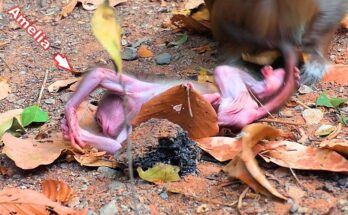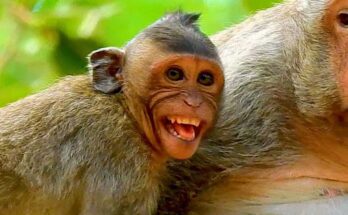In the quiet shadows of a tropical forest, where the sun gently filters through the tall canopy, a tiny newborn monkey entered the world. This fragile little soul, barely strong enough to lift her head, was born to a young mother named Nala. It should have been a moment filled with warmth, instinctive bonding, and loving care. But something felt different from the very beginning.
The newborn, later named Mika by observers, was unusually quiet and still. While most baby monkeys instinctively cling to their mothers from the moment of birth, Mika seemed hesitant, her tiny limbs failing to wrap around her mother’s warm belly. Instead of snuggling close for safety and milk, she pulled away, her weak body trembling slightly as if unsure of her place.
Nala, though inexperienced, tried her best. She leaned down, nudged Mika gently, and even repositioned herself to encourage the baby to nurse. But Mika resisted. Her mouth refused the nipple, and her eyes—still adjusting to the brightness of the world—held a distant, confused look. The forest around them was alive with sound, but between mother and baby, there was only stillness and disconnection.
Other mothers in the troop were already moving about, their babies clinging tightly, feeding and squeaking softly. Nala watched them with longing and confusion. She wrapped her arms protectively around Mika, hoping warmth and time would help. But hours passed, and still, Mika did not respond the way most newborns did.
The situation became worrying. Without milk, Mika’s strength would fade quickly. Her refusal to feed and to bond put her in danger—not just from hunger, but from the natural order of life in the wild. In the jungle, the weakest often get left behind.
Despite this, Nala never gave up. She stayed close, grooming Mika’s soft fur, licking her gently, and pressing her close whenever she could. Her eyes showed both love and desperation—an instinctive plea for her baby to connect, to hold on, and to survive.
Mika, though frail, began to show tiny signs of awareness. A twitch in her tail, a slight grip of her mother’s fur. They were small moments, but they gave hope. Slowly, Nala’s persistence seemed to spark something in her baby. It wasn’t yet a hug, nor a full acceptance of milk, but it was a beginning—a silent signal that Mika hadn’t fully given up.
The coming days would be crucial. In the wild, life is unforgiving, especially for the smallest and weakest. But with a mother like Nala—gentle, devoted, and fiercely protective—Mika might just find the strength to survive.
Though her start in life was heartbreaking, with rejection and silence where there should have been warmth, baby Mika’s story is not over. It’s only the beginning of a journey—one shaped by struggle, quiet love, and the fight to belong in a wild world.


